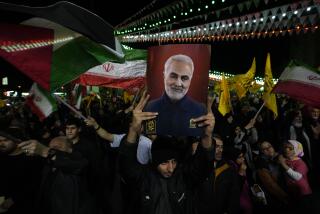Iran’s supreme leader boasts nation is standing tall on nuclear issue
Iran’s supreme leader declared Tuesday that the nation’s enemies had failed “to bring the Islamic Republic to its knees,” as advocates and critics of a nuclear deal hastened to put their spin on the latest extension of negotiations with world powers.
Ayatollah Ali Khamenei, speaking a day after negotiators in Vienna agreed on a seven-month extension of the nuclear talks, boasted that Iran was standing tall against a bullying West.
“The United States and European colonialist countries gathered and applied their entire efforts to bring the Islamic Republic to its knees — but they could not and they will not,” Khamenei told a gathering of clerics in the capital, Tehran.
The supreme leader did not explicitly endorse the extension, maintaining a characteristic aloofness, but it was not necessary for him to do so. Iran’s negotiating team would not have agreed to further talks without approval from Khamenei, who has the final say on matters of state policy.
The supreme leader, analysts say, has positioned himself skillfully to avoid any political fallout, deal or no deal. He has publicly backed the negotiations but expressed deep reservations about a satisfactory result, while always appealing to Iranians’ sense of pride.
Since the extension has his imprimatur, conservatives who had previously denounced the notion of continuing talks beyond the deadline were obliged to accept the new timetable, while voicing doubts that any final deal would ever emerge. Many here view the talks as part of a broader, U.S.-led scheme to weaken and ultimately overthrow Iran’s government.
“There is almost no doubt that, given America’s current stance, it will be very difficult to reach an agreement to which both sides remain committed,” wrote Hassan Mohammadi, a conservative analyst who urged officials to reveal “what humiliation the U.S.A. is trying to impose on the Iranian people.”
While the talks involve Iran and six nations — the United States, Russia, China, Britain, France and Germany — the key players are Washington and Tehran.
Unresolved are a number of core issues, including the scope of Iran’s future nuclear program and the timetable for lifting economic sanctions against Iran. Tehran insists its nuclear efforts are strictly for peaceful purposes, while Washington and its allies suspect a covert effort to produce atomic weapons.
Hard-liners here made much of what they labeled the pernicious influence of Saudi Arabia and Israel, close U.S. allies and regional archenemies of the Islamic Republic. Many Iranian commentators view Israel and Saudi Arabia as working hard behind the scenes to torpedo any realistic accord, even though neither nation is a party to the talks.
The Iranian press depicted U.S. Secretary of State John F. Kerry as taking marching orders from the Saudi foreign minister, Prince Saud al-Faisal, who flew to Vienna and met with Kerry.
“Saudi Arabia should know that petro-dollars do not always work,” Esmail Kosari, a conservative parliamentarian, told Iran’s Tasnim News Agency. “America is not to be trusted. The Zionist regime put pressure on Obama.”
Moderates favoring a nuclear accommodation took solace in the fact that the talks did not collapse outright, and that Iran will continue to receive limited sanctions relief in the form of $700 million a month from frozen accounts.
They described a future deal as inevitable, citing various factors: a closing of the gaps in each side’s demands; the fact that top U.S. and Iranian diplomats are meeting publicly, a sea change in the long-acrimonious relations; and common interests in the volatile region, including the battle against Islamic State extremists in Iraq and Syria.
“The path of the negotiations will lead to a final agreement, whether it is today or tomorrow,” Iranian President Hassan Rouhani, a moderate cleric who has championed the talks, predicted on Iranian TV. “The world does not have any other way but to engage in negotiations with the representatives of the Iranian nation.”
For the long-suffering Iranian masses, the extension did little to buoy hopes for improved living standards and an end to decades of relative isolation. Many citizens who backed the president’s push for sanctions relief say they feel deceived.
“For me and my family, life will be as hard as before,” concluded Mehdi, 29, a clerk who declined to give his last name for privacy reasons. “President Rouhani tied the improvement of everything to the success of sealing a deal and lifting sanctions. His talk is empty.”
Special correspondent Mostaghim reported from Tehran and Times staff writer McDonnell from Beirut.
Twitter: @mcdneville
More to Read
Start your day right
Sign up for Essential California for news, features and recommendations from the L.A. Times and beyond in your inbox six days a week.
You may occasionally receive promotional content from the Los Angeles Times.






